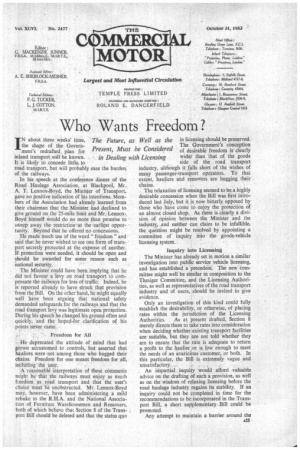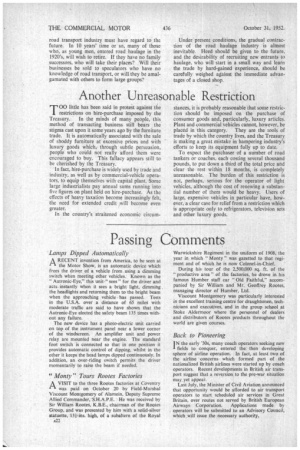Who Wants Freedom?
Page 23

Page 24

If you've noticed an error in this article please click here to report it so we can fix it.
IN about three, weeks' time. the shape of the , Goyern ment's redrafted, plan for inland transport willtbe known. It is likely to concede little, to road transport, but will probably ease the burden!, of the railways. . .
In his speech at the conference dinner of the Road Haulage Association, at Blackpool, Mr. A. T. Lennox-.13oyd, the Minister of Transport, gave no positive indication of his intentions; Members of the Association had already learned from their chairman that the Minister had declined to give ground on the 25-mile limit and Mr.-_Lennox-, Boyd himself would do no more than promise to• sweep away the restriction-,at the earliest opportunity. Beyond that he offered no concessions.
He made much use of the word " freedom " and• said that he never wished to see one form of transport secretly protected at the expense of another. if protection were needed; it should be open and should be awarded for some reason such as national security.
The Minister could have been.implying that he did not favour a levy on road transport to compensate the railways for loss oltraffic. Indeed, he is reported already to have struck that provision from the Bill. On the other hand, he might equally well have been arguing that national safety demanded safeguards, for the railways and that the road transport levy was legitimate open protection. During his speech he changed his ground often and quickly, and the hoped-for clarification of his points never came.
. Freedom for All He deprecated the attitude of mind that had grown accustomed to controls, but asserted that hauliers were not among those who hugged their chains. Freedom for one meant freedom for all, including the ,uSer.
A reasonable interpretation of these comments might be that the railways must enjoy as much freedom, as road transport and that the user's choice must be unobstructed. Mr. Lennox-Boyd may, however, have been administering a mild rebuke to the R.H.A. and the National Association of Furniture Warehousemen and Removers, both of which believe that Section 8 of the Trans. port Bill should be deleted and that the status quo in licensing should be preserved. The Government's conception of desirable freedom is clearly wider than that of the goods side of the road transport industry, although it falls short of the wishes of many passenger-transport eperators. TO that extent, hauliers and remoVers are hugging their chains.
. The relaxation of licensing seemed to be 'a highly desirable concession when the Bill was first introduced last July, but it is now bitterly opposed by those who have come to enjoy the protection of an almost closed shop. As there is clearly a division of opinion between the Minister and the industry, and neither can claim to be infallible, the question might be resolved by appointing a committee of inquiry into the goods-vehicle licensing system..
Inquiry into Licensing The Minister has already set in motion a similar investigation into public service vehicle licensing, and has established a precedent. The new Committee might well be similar in composition to the Thesiger Committee, and the Licensing Authorities, as well as representatives of the road transport industry and of users, should be invited to give evidence. . Only an investigation of this kind could fully, establish the desirability, or otherwise, of plaeing rates within the jurisdiction of the Licensing Authorities. As at present drafted, Section 8 merely directs them to take rates into consideration when deciding whether existing transport facilities are suitable, but they are not told whether they are to ensure that the rate is adequate to return a profit to the haulier or is low enough to meet the needs of an avaricious customer, or both. In this particular, the Bill is extremely vague and unsatisfactory. An iMpartial inquiry would afford valuable advice on the drafting of such a provision, as well as on the wisdom of relaxing licensing before the road haulage industry regains its stability. If an inquiry could not be completed in time for the recommendations to be incorporated in the Transport Bill, a short supplementary Bill could be promoted. Any attempt to maintain a barrier around the
road transport industry must have regard to the future. In 10 years' time or so, many of those who, as young men, entered road haulage in the 1920's, will wish to retire. If they have no family successors, who will take their places? Will their businesses be sold to speculators who have no knowledge of road transport. or will they be amalgamated with others to form large groups? Under present conditions, the gradual contraction of the road haulage industry is almost inevitable. Heed should be given to the future, and the desirability of recruiting ,new entrants to haulage, who will start in a small way and learn the trade by hard-gained experience, should be carefully weighed against the immediate advantages of a closed shop.












































































